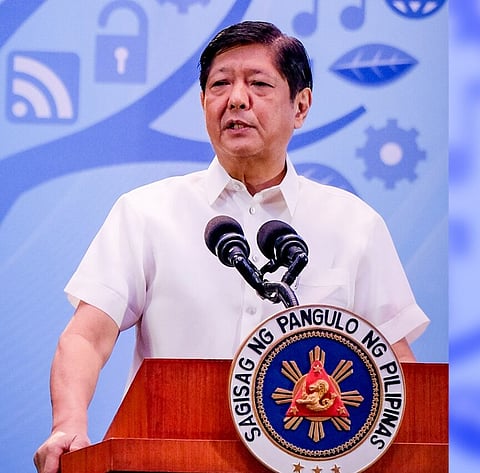
- NEWS
- the EDIT
- COMMENTARY
- BUSINESS
- LIFE
- SHOW
- ACTION
- GLOBAL GOALS
- SNAPS
- DYARYO TIRADA
- MORE

MELBOURNE — The future of Asia should be "shaped not by one or two, but by many actors" amid “threats” in the Indo-Pacific, President Ferdinand Marcos Jr. said.
Marcos Jr. made the remarks on Monday during a Lowy Institute-hosted event here on the sidelines of the ASEAN-Australia Special Summit.
“There are those who continue to see regional developments solely from the narrow prism of great power rivalries. Some reduce these developments for a regional regression towards outdated Cold War paradigms,” Marcos Jr. said.
“The future of this region will be shaped not by one or two, but by many actors, and they will each demand that their voices be heard, individually and collectively, as indeed they should be. Thus, the Philippines begins any conversation regarding great power competition with a strong rejection of any subordination of our distinct national interests and denial of our sovereignty and strategic agency,” Marcos Jr. added.
It is not new that Marcos specifically objected to the idea of analyzing regional security solely in terms of the rivalry between the US and China as superpowers.
Marcos stated that the Philippines disapproved of "misleading narratives that frame the disputes in the South China Sea solely through the lens of strategic competition between two powerful countries" during his speech at the ASEAN Summit in Indonesia in September 2023.
In Melbourne, several months later, he reiterated the same notion.
“We, in the Indo-Pacific, must ensure that great powers do not treat the world as an arena for their competition. The pursuit of the great powers’ respective strategic goals must never come at the expense of the interests of smaller states, nor of regional and international peace,” Marcos Jr. said.
The security and stability of the Indo-Pacific region has been a hot topic of conversation in Melbourne as Australia works to maintain its status as a crucial ASEAN ally.
The Philippines lies smack dab in the heart of this region, which is a hotbed of geopolitical conflicts in the larger Indo-Pacific. Tensions exist in the South China Sea and the West Philippine Sea, both of which the Philippines claims as its territory. In addition, China is pressing for the reunification of the democratically ruled island of Taiwan.
According to Marcos, both China and the US are crucial to preserving geopolitical stability and preventing the spread of nuclear weapons.
“Amidst the alarming reversal of the historic trend of decreasing nuclear stockpiles in the region, we must remember that the tragic humanitarian consequences of nuclear weapons use were borne by peoples of this region, the hibakusha of Hiroshima and Nagasaki, and the victims of nuclear tests in the Pacific,” Marcos said.
“It is time to bring Indo-Pacific issues to the fore of global conversations on nuclear disarmament. The People’s Republic of China and the United States must engage in meaningful dialogue to maintain strategic stability, and to limit any nuclear arms build-up,” he added.
The President gave his word that Japan, the Philippines, and Australia are leading the charge in lowering the risk of nuclear war in the area.
He went on to say that the threat posed by nuclear weapons shows how big nations must carefully handle their strategic rivalry.
